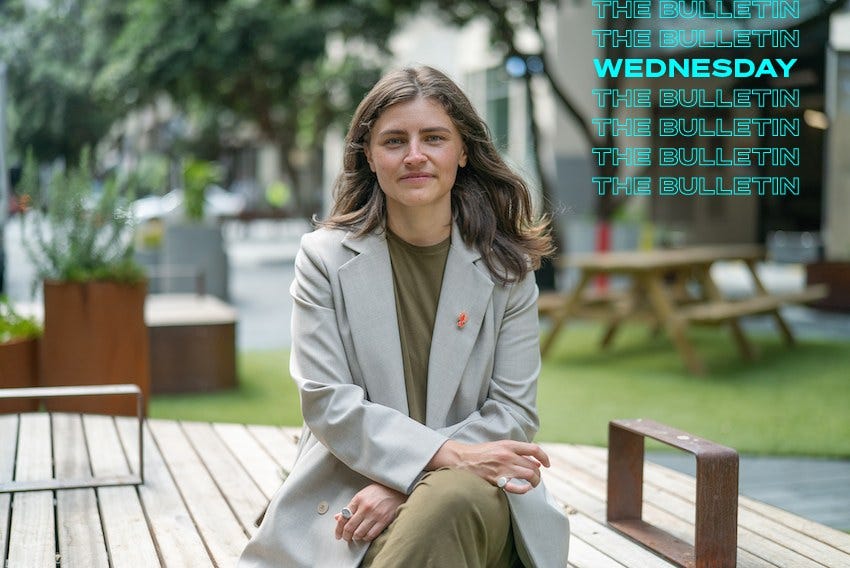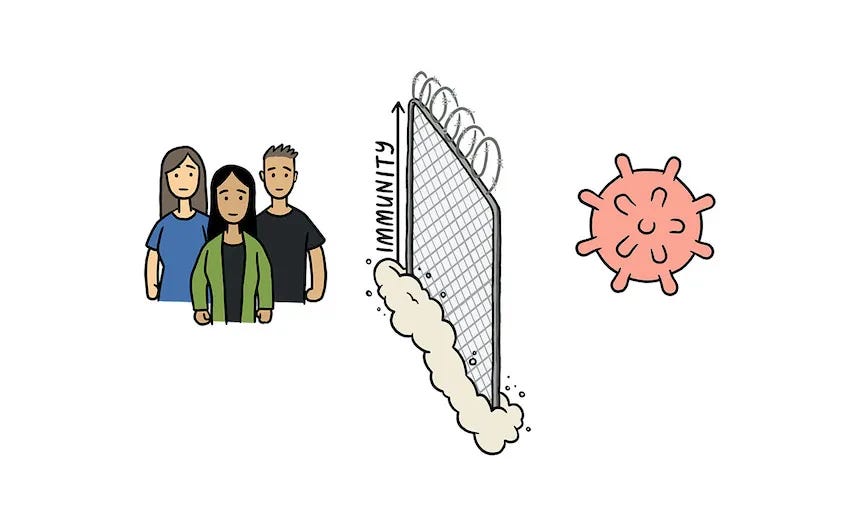Down on Main Street
Around the country, residents and officials are grappling with who and what central city areas are for.
Mōrena and welcome to The Bulletin for Wednesday, June 15, by Anna Rawhiti-Connell. Presented in partnership with Z Energy.
In today’s edition: Winston Peters takes legal action against Trevor Mallard; cheap food venture launches; orchestral board clashes; but first, the plans and problems for CBDs around the country.
MP Chlöe Swarbrick wants to pedestrianise Queen Street (Photo: Benjamin Brooking)
The death of the high street
This so-called death has been a big topic of conversation in the UK over the last few years. Retailers were already struggling before the pandemic and lockdowns exacerbated the trend. The Centre for Cities is a think tank dedicated to improving the economies of large cities and towns in the UK. In a series of blogs, two years on from the start of the pandemic in March, the Centre for Cities has said it believes a recovery is underway but it’s heavily caveated by a question about what recovery means when the baseline for many cities was low before the pandemic started. They pitch making cities more attractive as a place to do business and attracting investments for high-skilled, high-paid jobs as the solution to attracting people back. Demand for retail will follow, they say.
The death of Queen Street
In New Zealand, we have also been existentially wrestling with what and who central city areas are for since before the pandemic. It’s hit a kind of fever pitch in Auckland of late as we try to race past the lingering effects of the last two years and into an uncertain future. The NZ Herald has been running a series on rebirthing the central city (some articles are paywalled). There’s been a particular focus on the state of the city's main drag, Queen Street, which has been pronounced dead, apocalyptic and a slum. In a guest post on Greater Auckland, Nancy Mitchelson catalogues the cyclical history of the street and writes, “this is not the first time that Queen Street has become a touchstone for wider anxieties about the state of our city and the social fabric that binds us, and it is unlikely to be the last.”
Taking back the streets
MP for Auckland central Chlöe Swarbrick launched a petition to pedestrianise Queen Street yesterday. Swarbrick says it will “transform the area into a cultural hub and living space for our 40,000 residents and hundreds of thousands of visitors, instead of a thoroughfare that pushes people to the sidelines." Swarbrick cited Sydney's George Street as an example of success. There was a mixed bag of responses to the idea from Auckland’s mayoral candidates. Craig Lord really put it on the line by saying “one day Queen Street could be pedestrianised.” Ted Johnston was succinct and said “I am not in agreement.” Both Viv Beck and Wayne Brown said “not right now”. Leo Malloy thinks it’s lunacy and Efeso Collins said “more pedestrian-friendly areas in downtown Auckland is a good idea.”
Everywhere is grappling, battling and reimagining
Iwi-owned Tainui Group Holdings (TGH) has put a plan on the table in Hamilton to reimagine Centre Place, the inner city mall. I used to hang out there a lot as a teenager when it was cool and new. TGH says it’s drawing inspiration from Auckland’s Britomart so I guess that means Auckland isn’t a complete bust. In Dunedin, big upgrades are planned for its main street, George Street. In Tauranga, by-election candidates are divided about a $300m plan to redesign and redevelop the city centre. While Aucklanders are worried about the apocalypse on Queen Street, Wellingtonians are concerned about a loss of mojo. A recent council report found the sense of community and pride in the city has diminished sharply over the past four years.
If you’ve never heard of the Old Gays, you’ve been missing out. The group of four from California have found internet fame through their TikTok account, where they post dances, challenges and hilarious Q+A videos, and with over 7.3m followers, they’re more popular on the social media app than even Kim Kardashian. Robert Reeves, Jessay Martin, Bill Lyons and Mick Peterson call themselves the Old Gays, and they joined Tova on Today FM on Thursday morning to talk fame, friendship and having fun in old age. Listen to the interview here. (Sponsored)
Winston Peters takes legal action against Trevor Mallard
Mallard’s departure from parliament and expected move overseas now seem like a happy coincidence. Winston Peters has instructed lawyers to take legal action against Mallard after Peters was trespassed from parliament following his visit to the grounds during the protests in March. Mallard didn’t respond to RNZ’s request for comment as he is undergoing a medical procedure. Peters said that Mallard’s planned departure, announced yesterday, was not the "full truth" and Mallard was leaving because of his threat of legal action. The prime minister has denied this. Mallard will have to deal with Peters’ litigious approach at some stage but at least the Speaker’s departure from our shores will mean it won’t cause too much unnecessary distraction for the government. Peters was last in court in December over the leaking of a superannuation overpayment he received. The Supreme Court dismissed his application for leave to appeal and ordered him to pay $2,500 to the respondents.
Food truck can feed a family of four for $16
A story from Stuff’s Hamish McNeilly on a food truck in Dunedin is a great counter to the prevailing and depressing narrative about the cost of food. Set up as a social enterprise, onecouple are making and selling meals for $4 out of a food truck. They had always planned to work on a “cheap food project” but found building lease costs prohibitive. That the story landed on the same day as the Stats NZ food price index is just good timing. It tacks on quite nicely to a recent piece from Chris Schulz about a food co-op in Auckland. It’s one venture in Dunedin and one co-op in Auckland but in times that necessitate the existence of the pulse of the nation, the Spinoff’s cheese tracker, these kinds of stories provide some necessary light. They’re small acts of rebellion against the duopoly and a reminder that alternatives, where food and profit aren’t an inevitable pairing, can and do exist.
A message from senior writer Alex Casey:
Earlier in the year we published When the Lessons End, an in-depth examination of one woman’s experience at the hands of her private music teacher, and the impact it had on the rest of her life. Stories like these take months of rigorous reporting, travel costs and hefty legal fees to get to publication stage, all of which was only possible thanks to our members.
I feel so lucky to work for an organisation that encourages long-form investigative journalism, but the reality is that this work is impossible without the ongoing support of our readers. If you can, please support our work by donating today.
Board clashes at Symphony Orchestra
This is an interesting one from Stuff’s André Chumko about potential conflicts of interest in governance. The chairperson of the New Zealand Symphony Orchestra (NZSO), Laurence Kubiak, was told his contract would not be renewed four months after he declared he was joining the board of the Taxpayers’ Union. He said he would have been happy to stay on and did not see it as a conflict of interest. The Taxpayers’ Union is a self described union who “represent the common interests of all taxpayers and to provide them with a voice in corridors of power.” They frequently highlight projects funded by Creative New Zealand (CNZ) as an example of wasteful spending. In 2020, 72% of CNZ’s revenue came from the New Zealand Lottery Grants Board, not the government. The NZSO’s funding is not contestable. It is core funded by the government; ergo, the taxpayer.
Got some feedback about The Bulletin, or anything in the news? Get in touch with me at thebulletin@thespinoff.co.nz
Already had Covid? Unfortunately that doesn’t mean you’re invincible. Siouxsie Wiles and Toby Morris explain how waning immunity combined with a constantly changing virus means we can't rest on our laurels this winter. Toby Manhire talks to Gareth Hughes about his new biography of pioneering Greens leader Jeanette Fitzsimons. Tamsyn Muir reviews The Dawnhounds, Sascha Stronach's fantasy novel that's shamelessly, wonderfully chocka with te reo and New Zealand-isms. Chris Schulz pleads with the powers that be not to cover up the Bowl of Brooklands moat.
All Whites play Costa Rica in world cup qualifier
The All Whites are playing Costa Rica this morning in Doha. If they win, they qualify for the Fifa world cup. New Zealand has made it to men’s world cups twice in 13 previous attempts. If you open the Bulletin as soon as it lands, we’ll be right on half-time. If it’s later, we’ll have a result and I am a ghost of football past. Stuff have a live blog here including some great photos of football fans in Wellington and the minute by minute emotional rollercoaster of an All Whites’ goal being overturned just before the end of the first half. At the time of sending, the score was 1-0 to Costa Rica.
Our Umwelt is all we know
Today’s long read is from Ed Yong at The Atlantic, truly one of my favourite science writers. Our Blinding, Blaring World is adapted from his forthcoming book and is a look at how light and noise pollution are warping animal’s senses and how we can save the quiet and preserve the dark.
“Every animal is enclosed within its own sensory bubble, perceiving but a tiny sliver of an immense world. There is a wonderful word for this sensory bubble—Umwelt. Every Umwelt is limited; it just doesn’t feel that way. Each one feels all-encompassing to those who experience it. Our Umwelt is all we know, and so we easily mistake it for all there is to know. This is an illusion that every creature shares.”












Hi, I love the bulletin. However, today you covered the launch of a petition to pedestrianise queen st but provided no link to it. You did link a Herald article, which also did not link to the petition.